In the Book of Exodus, Moses’ life takes a transformative turn as he encounters a burning bush on Mount Horeb. This extraordinary event, narrated in Exodus 3:1–22, marks the beginning of his divine mission.
The Encounter: Moses, a shepherd tending to his flock, sees a bush engulfed in flames but miraculously not consumed. Curiosity draws him closer, and a voice from the bush identifies itself as the God of his forefathers – the God of Abraham, Isaac, and Jacob.
Divine Commission: God reveals His awareness of the Israelites’ suffering in Egypt and His plan to deliver them. Moses is chosen to lead this liberation. Initially hesitant, Moses questions his ability, but God assures him of His presence and guidance.
The Burning Bush Symbolism: The burning bush symbolizes God’s presence and holiness. It illustrates that God can manifest Himself in the ordinary and captivate our attention to convey His extraordinary plans.
Lessons Learned:
- Divine Calling: Moses’ experience teaches us to be receptive to unexpected moments of divine calling in our lives.
- God’s Presence: The burning bush signifies that God is with us in the ordinary, assuring us of His constant presence.
- Overcoming Doubt: Moses’ initial hesitation reflects common human doubts. God’s assurance teaches us to trust His plans despite our uncertainties.
Moses’ encounter with the burning bush becomes a pivotal moment in biblical history, highlighting the transformative power of divine interventions and the profound lessons embedded in such encounters.
Subscribe for Daily Email Devotionals










